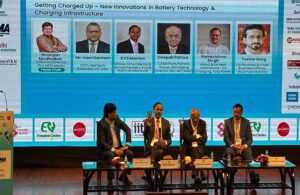Discussing next-generation advancements of electric mobility, Pan IIT Alumni and Alumni Associations of IIT (BHU) Varanasi bodies had organized ‘The Future Series, the EV Ecosystem Conclave’ in Delhi.
 The event witnessed discussions on the relevance of EVs, innovations, adoption and challenges in the auto sector.
The event witnessed discussions on the relevance of EVs, innovations, adoption and challenges in the auto sector.
The conclave aimed to comprehensively understand the dynamics of the quickly changing EV Ecosystem and how EVs represent one of the most promising pathways to reduce carbon emissions and improve air quality across India.
Understanding the challenges and exploring the concrete solutions, the experts looked to catapult the industry into the New Age Mobility.
Sanjeev Nikore, President, Alumni Associations of IIT (BHU) Varanasi, said, “India is investing heavily in the e-mobility shift. With an ambitious target to transition from Internal Combustion Engine (ICE) vehicles to electric vehicles, India has a rather herculean task ahead of itself. The Indian automotive sector is undergoing a rapid and robust overhaul – to propel the nation towards a greener future with minimalistic dependence on fossil fuels”
Currently, the EV industry in India is at a nascent stage, which has open opportunities for auto players to develop efficient EVs for Indian consumers.
There is a total of 13, 92,265 EVs on Indian roads as of August 2022. By 2030, this will likely increase by 45–50 million EVs on the road.
B K Panigrahi, Institute Chair Professor, Department of Electrical Engineering Head, Centre for Automotive Research and Tribology (CART), IIT Delhi said, “While the need for EVs is critical for a sustainable future there are many challenges – notably high cost of EVs and range anxiety among consumers due to the slow pace of building the charging infrastructure. Also, there are challenges such as insufficient Service Stations, Skilled Manpower, less options as compared to ICE vehicles, and Battery manufacturing and cell testing at proper scale”
Debashish Bhattacharya, President, Pan IIT Alumni said, “The focus and drive to replace conventional vehicles based on fossil fuels is bringing about a radical transformation, the scope of which is huge. While this creates a very large opportunity that will play out for a long time, there are challenges in multiple dimensions. The obvious ones are battery technology, range, affordability and infrastructure,”
Sanjeev Malhotra, CEO, NASSCOM Center of Excellence – IoT & AI said, “IoT and AI technology have a significant presence in the electrical vehicles whether it is a battery management system, regenerative braking or advanced driver assistance features. Going forward these are expected to play a critical role in areas like predictive maintenance, creating real-time alerts for the users, and overall additions to vehicle and passenger safety”
Shomik Raj Mehndiratta, Practice Manager, Transport South Asia, The World Bank said, “India is already an important player in the 2/3- wheeler market – which has the potential to accelerate significantly shortly and make a material impact on pollution in Indian cities and on India’s carbon emissions. The e-bus grand challenge run by CESL has the potential to make India a global leader in e-buses.”

